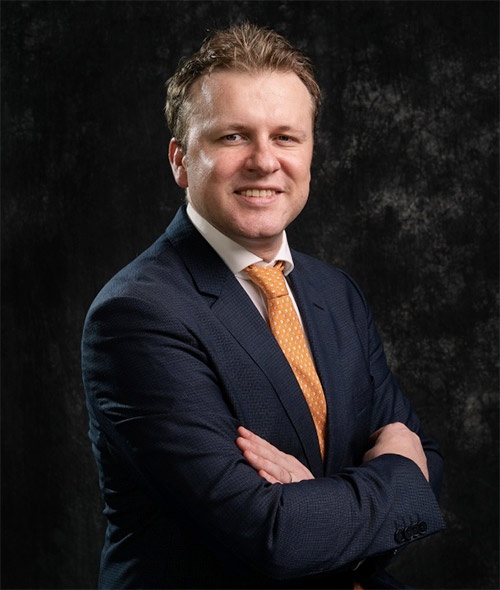Journey of thriving sustainability by De Heus and Hung Nhon
 |
| Johan van den Ban, CEO of De Heus Vietnam |
De Heus and Hung Nhon teamed up to build high-tech agricultural complexes in Vietnam. How do the two parties take advantage of each other to meet targets?
By combining the best of both worlds and sharing the same vision to improve and modernise the livestock sector, we are contributing to a competitive independent farming sector, enhancing productivity, and improving the livelihood of farmers. De Heus and Hung Nhon are well coordinated and benefit from each other.
De Heus has more than 110 years of experience in animal nutrition and supporting farmers around the world with on-the-farm support solutions.
On the other hand, Hung Nhon Group offers strong local knowledge and experience in the Vietnamese livestock sector and has a good track record of applying high-tech solutions in livestock farming.
Furthermore, both companies have a good combination of young, energetic, and experienced employees and dedicated senior specialists who are the driving force to help us realise our projects sustainably.
Could you provide further information about the sustainability journey?
Globally, we have developed a long-term sustainability programme called Responsible Feeding to ensure our commitment to the journey of sustainable development. This programme is designed around four pillars covering De Heus’ core activities and our position within the food production supply chains we operate in.
It helps us to identify and prioritise local opportunities to produce more efficiently and responsibly, reduce our environmental impacts, and contribute to the development of the local communities.
We have also decided on a set of four long-term global sustainability ambitions called Global Green Goals.
They are robust and measurable targets for 2030, focused on reducing antibiotics and carbon footprint, increasing the use of certified raw materials, and helping local farmers to develop their businesses. All of De Heus' global business units are committed to realising these goals.
We want to make sure our efforts are accountable and transparent. Therefore, we will also constantly track the general performance of the most critical sustainability indicators and the progress of our Global Green Goals.
In close collaboration with the Ministry of Agriculture and Rural Development, we aim to play a leading role to reduce the use of antibiotics. We also proactively develop solutions for the circular economy, developing extensive baseline studies and constantly training farmers to improve their income levels in rural areas.
The complex in Gia Lai is the fourth that applies high-tech approaches to the entire feeding process. What is the role of such sites in modernising Vietnam’s agriculture?
These complexes are modern and powered by green energy that significantly reduces CO2, while also using eco-friendly farming methods. With these projects, our goal is to develop disease-free farming areas in the central highlands and contribute to positioning the region as the high-tech production centre of Vietnam.
By doing so, we want to help farmers gain access to international-standard genetics and achieve farming productivity on par with that of more developed countries.
Vietnam targets net-zero emissions by 2050. Could you share any further information about the plans to implement a low-carbon agricultural value chain?
As one of the world’s leading animal nutrition providers, we take responsibility for growing our business sustainably and implementing circular-economy solutions.
We are also working hard to support Vietnam’s ambition to be carbon neutral by 2050. We have been sourcing local raw materials and would like to continue to do more in terms of corn and cassava through multiple strategic projects in modern cooperatives in the central highlands.
Furthermore, after the acquisition of MNS Feed, De Heus went from nine feed mills to more than 20 across Vietnam. With our extended footprint, we are located closer to our customers, which reduces transportation distance and CO2 emissions significantly. We also use sustainable materials and energy sources at all of our feed mills and are in the process of installing solar panels at all of our locations.
We have been doing extensive research with agricultural universities, research institutes, and our own farms, trying different concepts to measure waste impact, including methane emissions, at the farm level.
Through our on-the-farm technical services and excellent nutritional solutions, our farmers become more efficient and reduce their methane production.
What the stars mean:
★ Poor ★ ★ Promising ★★★ Good ★★★★ Very good ★★★★★ Exceptional
Related Contents
Latest News
More News
- The next leap in Cloud AI (December 11, 2025 | 18:19)
- Vietnam’s telecom industry: the next stage of growth (December 11, 2025 | 18:18)
- Five tech predictions for 2026 and beyond: new era of AI (December 11, 2025 | 18:16)
- CONINCO announces new chairman and CEO (December 10, 2025 | 11:00)
- How AWS is powering the next-gen data era (December 09, 2025 | 13:14)
- Outlook in M&A solid for Singapore (December 08, 2025 | 10:31)
- Vietnamese firms are resetting their strategy for global markets (December 05, 2025 | 17:04)
- LPBank Securities accelerates AI and data innovation with AWS (December 05, 2025 | 09:00)
- Improving traceability capacity with Zebra Technologies (November 26, 2025 | 10:08)
- Ho Chi Minh City engages 500 CEOs in dialogue on building global megacity (November 25, 2025 | 16:00)

 Tag:
Tag:



























 Mobile Version
Mobile Version